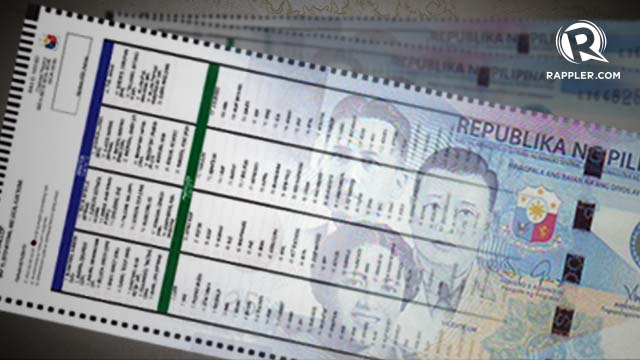SUMMARY
This is AI generated summarization, which may have errors. For context, always refer to the full article.

MANILA, Philippines – While the poll body is gung ho about its so-called “money ban” – requiring banks to limit daily withdrawals to P100,000 – the Central Bank is reluctant to implement this unprecedented rule against vote buying.
The Bangko Sentral ng Pilipinas (BSP) on Tuesday, May 7, said the money ban violates the Philippines’ bank secrecy laws.
In a resolution promulgated Tuesday, the Commission on Elections (Comelec) said it will limit bank withdrawals to P100,000 starting Wednesday, May 8, until election day, May 13. The Comelec is doing this “to prevent the circulation of cash which can be used for vote buying,” said poll chief Sixto Brillantes Jr.
“If we will limit it to only P100,000 each, it will be very difficult to withdraw millions of pesos,” Brillantes said.
In a statement, however, the BSP said: “The BSP is also constrained from enforcing the Comelec resolution because this would necessarily entail looking into bank deposit accounts.”
The Central Bank described the resolution as “essentially unsound.” It said it violates Republic Act No. 1405, which covers the secrecy of peso deposits, and RA No. 6426, which covers dollar secrecy. (Read the “money ban” resolution below.)
Comelec Resolution No. 9688: ‘Money Ban’
It also said the withdrawal limit “may disrupt normal business and commercial transactions in the Philippines.”-
“The Bangko Sentral ng Pilipinas supports the Comelec’s goal to ensure clean and honest elections in the Philippines. However, the BSP believes that limiting cash withdrawals to P100,000 and for the monetary authority to enforce this may not be the best way to achieve the goal of clean and honest elections,” the BSP said.
The Comelec has deputized the BSP and other government financial agencies to implement this resolution.
‘No restraint’
Brillantes, on the other hand, defended the Comelec’s money ban, saying it will not affect businesses.
“There will be no restraint of trade; commerce would still move. The bigger transactions can be transacted through checks,” Brillantes explained in an interview with reporters.
Besides, he said, it will not require looking into bank accounts, but simply controlling their cash withdrawals. Even under ordinary circumstances, banks can limit withdrawals, as when ATMs set a P20,000 daily withdrawal cap. (Watch more in the video below.)
The money ban also covers “finance companies, quasi-banks, pawnshops, remittance companies, and institutions performing similar functions,” according to the Comelec resolution.
The new Comelec resolution also prohibits “the transportation and/or carrying of cash exceeding P500,000 or its equivalent in any foreign currency from May 8 to 13, 2013.” The resolution says carrying or transporting such amount “shall be presumed for the purpose of vote buying and electoral fraud in violation of the money ban.”
The resolution also allows warrantless arrests against vote buyers and sellers. – Rappler.com
Add a comment
How does this make you feel?
There are no comments yet. Add your comment to start the conversation.